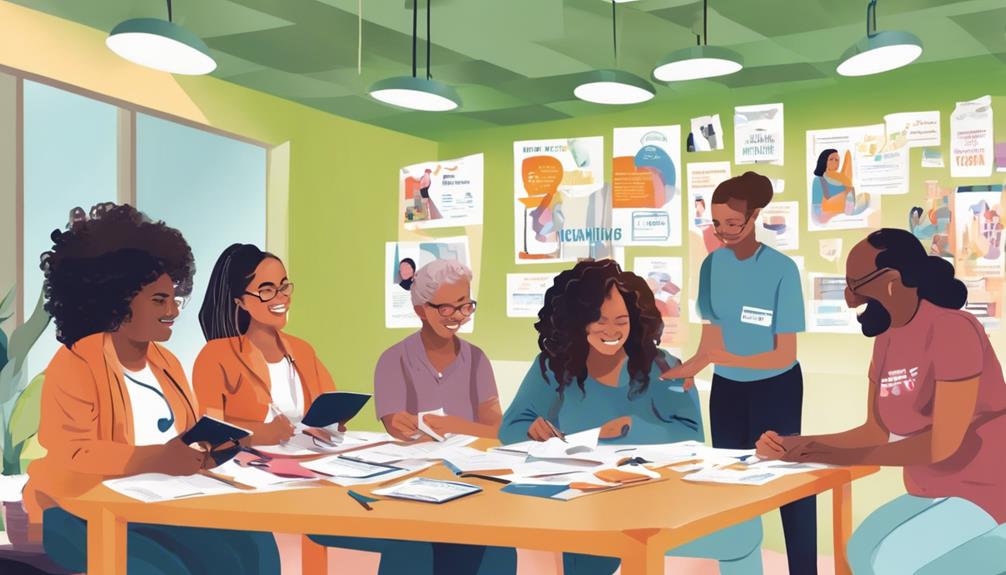Health and human services are essential resources that enhance your well-being and access to care. You can find these services in local community centers, which provide healthcare initiatives and mental health support. Online platforms also offer telehealth services and educational resources. If you need help maneuvering through social services or understanding eligibility for programs like Medicaid, local organizations can guide you. In addition, nonprofits often target underserved populations, ensuring equitable access to services. This landscape is complex, and exploring it more can reveal additional resources and strategies to improve your health and access to support systems.
Understanding Health Services

Health services encompass a broad range of medical, preventive, and rehabilitative care designed to improve individual and community well-being. Understanding these services is essential for addressing healthcare disparities that persist across various populations.How To Clean My Yoga MatDoes Doing Yoga Help Lose Weight
You may notice that access to quality healthcare often varies considerably based on socioeconomic status, geographic location, and race. These disparities can lead to inadequate health outcomes for marginalized groups.
Patient navigation plays a significant role in mitigating these disparities. By guiding individuals through the complex healthcare system, patient navigators help guarantee that patients receive the appropriate care at the right time. They assist in scheduling appointments, understanding treatment options, and overcoming barriers to access, such as transportation or financial constraints.
Research shows that effective patient navigation can greatly improve health outcomes and increase patient satisfaction. When patients feel supported and informed, they're more likely to engage in their care actively.
As you explore health services, consider how these elements work together to create a more equitable healthcare landscape. Understanding the interplay between healthcare disparities and patient navigation is important in fostering a system that truly serves all individuals effectively.
Exploring Mental Health Resources
Access to mental health resources is essential for fostering emotional well-being and addressing the increasing prevalence of mental health disorders in communities. You might be surprised to learn that effective mental health support can greatly enhance emotional resilience, enabling individuals to cope better with stress and adversity.
Mindfulness practices, such as meditation and deep breathing exercises, have gained considerable attention for their role in promoting mental health. Research shows that these practices can reduce anxiety, improve focus, and increase overall life satisfaction. Incorporating mindfulness into your daily routine can help you cultivate a greater sense of self-awareness and emotional regulation.
Additionally, accessible mental health resources, like therapy, support groups, and online platforms, can provide the necessary tools to navigate life's challenges. Engaging with these resources not only helps you manage existing mental health issues but also equips you with strategies to build emotional resilience.
Accessing Social Services

Finding your way through social services can often feel overwhelming, but understanding the available resources and how to utilize them effectively can greatly improve your quality of life. Start by evaluating your social service eligibility, which often depends on factors like income, family size, and specific needs. Many agencies require documentation, so gather necessary paperwork beforehand to streamline the process.
Access barriers can considerably hinder your ability to receive assistance. These may include lack of transportation, limited availability of services, or complex application processes. To mitigate these barriers, consider reaching out to local organizations that specialize in maneuvering social services. They can offer guidance and support, helping you overcome obstacles.
Additionally, familiarize yourself with online portals where you can apply for services or find information. Knowing how to efficiently access social services not only saves time but also guarantees you receive necessary support. Stay informed about changes in eligibility criteria and available programs, as these can shift frequently.
Local Community Centers
Local community centers often serve as vital hubs for social services, providing residents with essential resources and support tailored to their needs.
These centers foster community engagement by encouraging participation in local programs and events. They act as a bridge between residents and the services they require, from job training to mental health support.
Wellness initiatives offered through community centers address physical and mental health, promoting a holistic approach to well-being. For instance, you might find fitness classes, nutrition workshops, and mental health counseling all under one roof.
Research shows that communities with active centers report higher levels of social cohesion, which directly influences residents' overall health outcomes.
Moreover, local centers often collaborate with healthcare providers, ensuring that you have access to screenings and health education. This integration of services not only simplifies access but also emphasizes preventive care, helping you stay informed about your health needs.
Online Health Resources

Many people turn to online health resources for reliable information and support, making it easier to manage their well-being from the comfort of home. These resources include websites, apps, and telehealth services that provide accessible health education and virtual wellness options.
This shift toward digital platforms has significant implications for healthcare delivery. The telehealth benefits are evident, as they allow you to consult healthcare professionals without the need for in-person visits. You can access expert advice, mental health support, and chronic disease management—all tailored to your schedule.
This convenience not only saves time but also reduces barriers to care, particularly for those living in remote areas. Moreover, online health resources facilitate the sharing of evidence-based information, enabling you to make informed decisions about your health.
Many platforms offer interactive tools, such as symptom checkers and personalized health assessments, which enhance your ability to monitor your well-being effectively.
Government Assistance Programs
Government assistance programs play an essential role in providing important support services to individuals and families, ensuring access to healthcare, nutrition, and financial aid during challenging times. These programs, such as Medicaid and the Supplemental Nutrition Assistance Program (SNAP), help bridge the gap for those who might otherwise struggle to meet their basic needs.
Understanding healthcare eligibility is imperative for accessing these services. Many programs are income-based, meaning your household income determines your eligibility. For instance, Medicaid eligibility often extends to low-income individuals and families, covering a significant portion of healthcare costs. This access can dramatically improve health outcomes, especially during emergencies or for individuals with chronic conditions.
In addition to healthcare, financial assistance programs like Temporary Assistance for Needy Families (TANF) provide cash benefits to eligible families, helping them manage expenses during tough times. By leveraging these resources, you can alleviate financial burdens, allowing you to focus on recovery and stability.
Nonprofit Organizations and Support

Nonprofit organizations serve as essential lifelines, offering indispensable support and resources to individuals and families facing various challenges in their pursuit of health and stability. These organizations often engage in community outreach initiatives, targeting underserved populations to guarantee access to critical health services. By working directly within communities, nonprofits can identify specific needs and tailor their programs accordingly.
Moreover, they play a significant role in promoting health equity. Many nonprofits focus on reducing disparities in healthcare access, addressing socioeconomic barriers that hinder individuals from receiving adequate care. For instance, they may provide free clinics, mental health resources, or educational workshops aimed at empowering communities.
Research indicates that nonprofit interventions can lead to measurable improvements in health outcomes, demonstrating their effectiveness in enhancing community well-being. By fostering partnerships with local agencies and stakeholders, these organizations amplify their impact and reach.
In essence, nonprofits not only fill gaps left by government programs but also advocate for systemic changes that promote health equity. Your support of these organizations can contribute to a more just healthcare system, guaranteeing that everyone has the opportunity to achieve peak health.
Conclusion
In maneuvering health and human services, you've got a wealth of resources at your fingertips.
By understanding available health services, exploring mental health options, and accessing social services, you can better meet your needs.
Local community centers and online resources provide additional support, while government assistance programs and nonprofit organizations can offer essential aid.
Engaging with these services not only enhances your well-being but also fosters a stronger, healthier community.
Don't hesitate to reach out and utilize these valuable resources.
